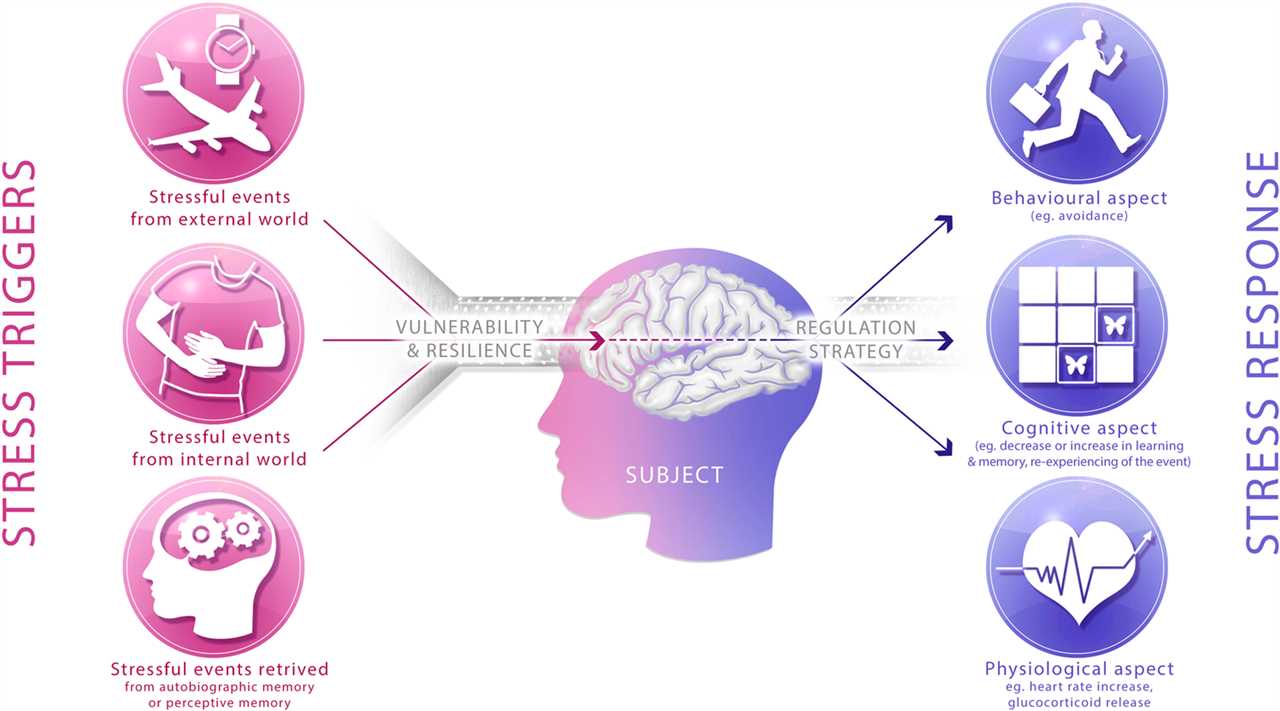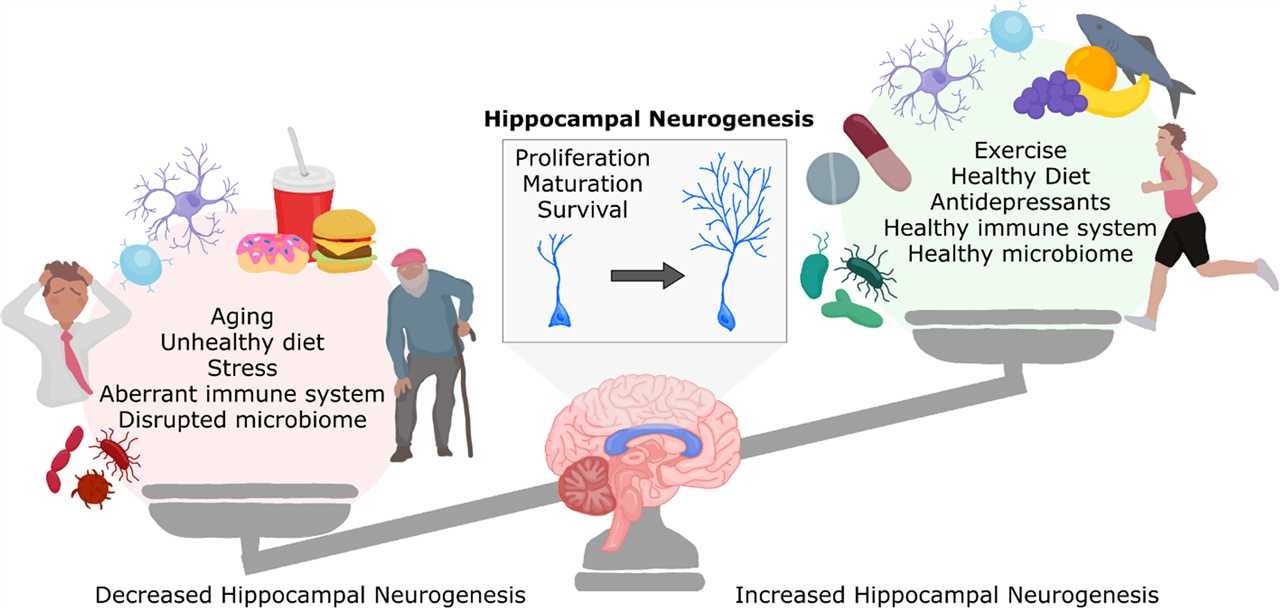
Resilience, the ability to adapt and bounce back from stress, is a crucial quality for maintaining mental and emotional well-being. In today’s fast-paced and demanding world, stress has become an inevitable part of our lives. However, recent research has shed light on a fascinating mechanism that confers resilience against stress – hippocampal neurogenesis.
The hippocampus, a region of the brain involved in memory and learning, has been found to play a key role in stress and resilience. Neurogenesis, the process of generating new neurons, occurs in the hippocampus throughout life. This process is influenced by various factors, including stress.
Studies have shown that chronic stress can impair neurogenesis in the hippocampus, leading to cognitive deficits and an increased vulnerability to stress-related disorders such as anxiety and depression. On the other hand, promoting neurogenesis in the hippocampus has been found to enhance resilience to stress and improve mental health.
So how does hippocampal neurogenesis build stress resilience? One theory is that the new neurons generated in the hippocampus help to buffer against the negative effects of stress by enhancing the brain’s adaptive capacity. These new neurons are thought to contribute to the formation of new neural circuits and promote flexibility in the brain, allowing individuals to better cope with and recover from stressful experiences.
The Role of Hippocampal Neurogenesis in Stress Resilience
Resilience is the ability to adapt and bounce back in the face of adversity, and it plays a crucial role in our overall well-being. Stress, on the other hand, is a common experience that can have negative effects on both our physical and mental health. However, recent research suggests that the process of neurogenesis in the hippocampus may play a significant role in building stress resilience.
Neurogenesis refers to the creation of new neurons in the brain, specifically in the hippocampus, which is a region associated with learning and memory. Studies have shown that chronic stress can inhibit neurogenesis, leading to a decrease in the number of new neurons being generated. This decrease has been linked to the development of stress-related disorders such as depression and anxiety.
On the other hand, research has also shown that promoting neurogenesis in the hippocampus can enhance resilience to stress. Studies conducted on animals have demonstrated that increasing neurogenesis through various interventions, such as physical exercise or environmental enrichment, can improve the ability to cope with stressors.
One possible explanation for this resilience-building effect is that the newly generated neurons in the hippocampus may contribute to the formation of new neural circuits that are involved in stress regulation. These circuits may help to dampen the stress response and promote adaptive coping strategies.
Furthermore, neurogenesis may also confer resilience by enhancing the plasticity of existing neural circuits. Plasticity refers to the brain’s ability to change and adapt in response to experiences. By promoting neurogenesis, the hippocampus may become more flexible and better able to adapt to stressors, ultimately leading to increased resilience.
Overall, the role of hippocampal neurogenesis in stress resilience is an exciting area of research that holds promise for understanding and potentially treating stress-related disorders. By understanding the mechanisms underlying neurogenesis and how it relates to resilience, scientists may be able to develop new strategies for promoting mental health and well-being in individuals exposed to chronic stress.
Understanding Hippocampal Neurogenesis
The hippocampal region of the brain, located in the medial temporal lobe, plays a crucial role in learning and memory processes. Recent studies have shown that this region is also involved in stress responses and resilience.
Neurogenesis, the process of generating new neurons, occurs in the hippocampus throughout life. This phenomenon has been found to be particularly important in the context of stress. Chronic stress has been shown to reduce neurogenesis in the hippocampus, while interventions that reduce stress or promote resilience can increase neurogenesis.
Stress, both acute and chronic, has a negative impact on the brain and overall mental health. It can lead to cognitive impairments, mood disorders, and even neurodegenerative diseases. Understanding the role of hippocampal neurogenesis in stress resilience is therefore crucial for developing effective strategies to combat the negative effects of stress.
Research has shown that neurogenesis in the hippocampus confers resilience to stress. The newly generated neurons are thought to contribute to the formation of new memories and the remodeling of existing neural circuits, which may help individuals adapt to and recover from stressful experiences.
Furthermore, studies have suggested that neurogenesis in the hippocampus may be linked to the regulation of the hypothalamic-pituitary-adrenal (HPA) axis, which is a key stress response system in the body. This suggests that promoting neurogenesis could potentially have therapeutic benefits for individuals with stress-related disorders.
In conclusion, understanding hippocampal neurogenesis is essential for unraveling the complex relationship between stress and resilience. By exploring the mechanisms underlying neurogenesis and its role in stress responses, researchers can develop targeted interventions to enhance stress resilience and improve mental health outcomes.
The Impact of Stress on Hippocampal Neurogenesis
Neurogenesis, the process of generating new neurons, plays a crucial role in various cognitive functions, including learning and memory. The hippocampus, a brain region integral to these processes, is particularly vulnerable to the effects of stress.
Chronic stress has been shown to negatively impact hippocampal neurogenesis, leading to a decrease in the production of new neurons. This reduction in neurogenesis has been associated with cognitive impairments and an increased risk of developing stress-related psychiatric disorders, such as depression and anxiety.
Stress-induced changes in the hippocampus are thought to occur through multiple mechanisms. One mechanism involves alterations in the release of stress hormones, such as cortisol, which can disrupt the proliferation and survival of neural stem cells in the hippocampus. Additionally, stress can also lead to inflammation and oxidative stress, further impairing neurogenesis.
Importantly, while chronic stress can have detrimental effects on hippocampal neurogenesis, there is growing evidence that certain individuals may be more resilient to these effects. Resilience refers to the ability to adapt and recover from stressful experiences.
Studies have shown that factors such as genetics, early-life experiences, and environmental enrichment can confer resilience to the negative impact of stress on neurogenesis. For example, individuals with a genetic predisposition for higher neurogenesis may be less affected by chronic stress. Similarly, early-life experiences that promote a nurturing and stimulating environment can enhance neurogenesis and buffer against the effects of stress.
Understanding the impact of stress on hippocampal neurogenesis is crucial for developing interventions and strategies to promote stress resilience and protect against the negative consequences of chronic stress. Future research in this field may uncover novel therapeutic targets and approaches for mitigating the effects of stress on neurogenesis and improving mental health outcomes.
| neurogenesis | confers | resilience | hippocampal |
Strategies to Promote Hippocampal Neurogenesis and Stress Resilience
Stress is a common experience in daily life that can have detrimental effects on mental and physical health. The hippocampus, a region of the brain involved in learning and memory, is particularly vulnerable to the negative effects of stress. However, recent research has shown that promoting hippocampal neurogenesis, the process of generating new neurons, can enhance stress resilience and protect against the harmful effects of stress.
There are several strategies that have been found to promote hippocampal neurogenesis and increase stress resilience:
- Exercise: Regular physical activity has been shown to increase the production of new neurons in the hippocampus. This can help to improve cognitive function and reduce the impact of stress on the brain.
- Stress reduction techniques: Practicing stress reduction techniques such as mindfulness meditation or deep breathing exercises can help to lower stress levels and promote hippocampal neurogenesis.
- Social support: Maintaining strong social connections and having a support network can help to buffer the negative effects of stress and promote hippocampal neurogenesis.
- Healthy diet: Eating a nutritious diet that is rich in antioxidants and omega-3 fatty acids can support hippocampal neurogenesis and enhance stress resilience.
- Sleep: Getting enough quality sleep is essential for brain health and promoting hippocampal neurogenesis. Poor sleep can impair cognitive function and increase susceptibility to stress.
- Environmental enrichment: Providing a stimulating environment with opportunities for learning and exploration can promote hippocampal neurogenesis and enhance stress resilience.
Overall, promoting hippocampal neurogenesis through these strategies confers resilience against the negative effects of stress. By incorporating these practices into daily life, individuals can enhance their ability to cope with stress and protect their brain health.
Exercise and Physical Activity

Engaging in regular exercise and physical activity has been shown to have numerous benefits for overall health and well-being. In particular, exercise has been found to have a positive impact on hippocampal function and neurogenesis, which can contribute to building stress resilience.
Studies have shown that exercise stimulates the production of growth factors in the hippocampus, such as brain-derived neurotrophic factor (BDNF), which promotes the survival of existing neurons and the generation of new neurons. This process, known as neurogenesis, plays a crucial role in the brain’s ability to adapt to stress and recover from it.
Regular exercise has also been found to increase the volume of the hippocampus, which is associated with better memory and cognitive function. This structural change in the brain may contribute to the enhanced resilience to stress that is observed in individuals who engage in regular physical activity.
Furthermore, exercise has been shown to have a direct impact on mood and mental health. Physical activity releases endorphins, which are natural mood-boosting chemicals in the brain. This can help reduce feelings of anxiety and depression, which are often associated with chronic stress.
It is important to note that the type and intensity of exercise may play a role in its effects on hippocampal neurogenesis and stress resilience. Aerobic exercise, such as running or swimming, has been found to be particularly beneficial for promoting neurogenesis and improving cognitive function. However, any form of physical activity can have positive effects on mental health and well-being.
In conclusion, incorporating regular exercise and physical activity into one’s routine can confer numerous benefits, including promoting hippocampal neurogenesis and building stress resilience. By engaging in exercise, individuals can enhance their brain’s ability to adapt to and recover from stress, leading to improved overall well-being.

I am Patrina de Silva, a psychologist and mental health blogger in Sri Lanka. After obtaining psychology degrees from the University of Colombo and Monash University, I returned home to work as a counselor while also starting the popular blog “Pressy but Happy” to provide advice on psychological issues. Over the past decade, my empathetic articles have made my blog a leading mental health resource in the country. In addition to writing, I maintain a private therapy practice, frequently volunteer counseling time, and conduct seminars, driven by my passion for destigmatizing mental illness and educating the public on the mind-body connection. I strive to be an influential voice in my field through my compassionate approach.
